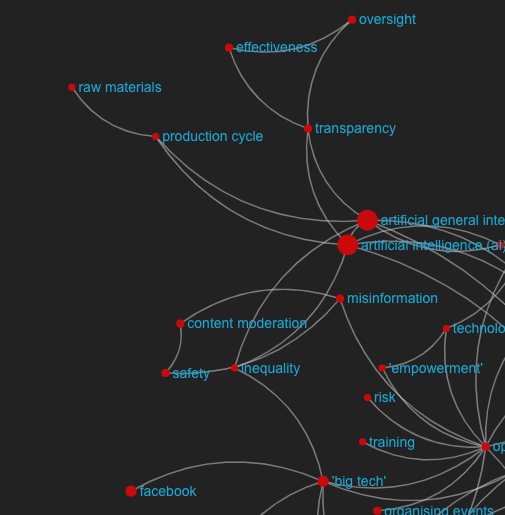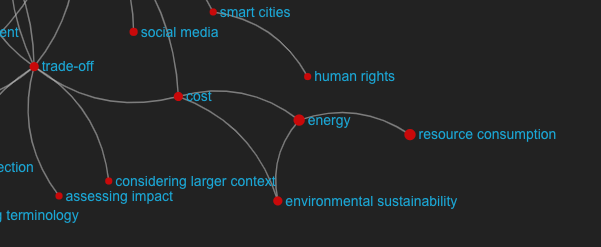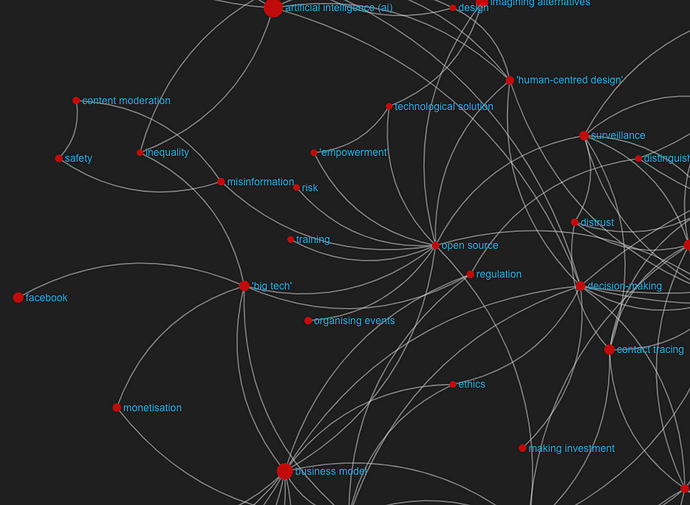Edgeryders (written from the perspective of community members’ experiences with these topics):
Online shift’s effect on offline space and sociality
The pandemic has intensified a process that many community members felt was already occurring: a sense of disappearance of work-life separation, mediated by the dissolution of public-private boundaries enabled by the internet (in part due to a sense of technology being “always on” and increased feelings of surveillance at work). New configurations of offline-online work and leisure time, like work-life balance vs work-life integration , have been topics of discussion. Part of the impact of covid-19 has been a shift to online and a corresponding sense of loss: of public space, of social engagement, with mental health impacts. One way of addressing this has been to seek a sense of community by reworking offline spaces to increase social interaction even as work and education increasingly shifts online. These are connected to larger questions about imagining the future and building alternatives: the Next Generation Internet is about more than just online social dynamics, and what we bring to bear on it is this question of what it does to communities, how we make them, and how we imagine other worlds together, through our everyday engagements with internet technology and its impacts.
Work-life balance is diversifying, so workspaces won’t all look the same, and because of the capacities of online communication, we can potentially begin to radically rethink what a workspace is, to make it more conducive for the well-being of more people (especially if we can resist exploitative surveillance tech). We’re also learning about the limits of online communication – fatigue and capacity. Digital policy is still about holistic human experience, so the internet’s effect on public space and its uses are still huge factors in crafting it.
Negotiating Privacy/Personal Data Trade-offs
The crucial subcategory here is the relationship between corporate interest (particularly of “big tech” companies) and public good (part of the profit/power nexus discussed in the report). Key topics here include user agency and control and the trade-off that sets up with user experience: how much effort community members without a high level of technological expertise can or want to to put in to controlling their personal data and deciding what trade-offs are worth it.
There’s an emergent theme of individualising responsibility: that responses to problems that are created by and large by institutions are being proposed on the individual level (e.g. improving your own privacy settings, making decisions about what you’re willing to trade off, becoming more educated about the promises and perils of online behaviour). Removing this onus from the individual is important, but individuals also feel overwhelmed at the power yielded by large corporations and unable to see where they can meaningfully intervene when they want to. But what about the collective responses that aren’t as institutional, like open source projects and citizen education? Are these the areas we might be able to see people effecting change in — bigger than the individual, but not as daunting as trying to change the behaviour of big corporations head-on?
Who owns data is also a key theme here, relating to the issue of data governance and control over personal data. “Defining terminology” is a code often tied to some of the models themselves, which indicates that more clarity is needed when entering buzzword territory around data governance models.
The promises and possible shortcomings of Open Source technology.
Open Source is a hot topic on the platform, discussed by a wide range of community members (from grassroots activists to academics, technologists and beyond). Questions emerge around whether open source solutions can lead to greater empowerment, human-centred design, and imagining other alternatives to the status quo (of “big tech” control).
Follow-ups emerge from this: how accessible are these collective responses (e.g. are open source movements accessible to more than just a small amount of homogenous people in terms of socioeconomic demographics? Do these citizen education projects still serve to shift focus and blame away from big tech/corporations, or do they offer another way forward in terms of collective action?)
Algorithms, AI and Regulation
Content moderation, misinformation, safety, inequality, transparency, and oversight all come up in relationship to artificial intelligence and algorithms. Understanding how community members discern the truth (related to issues of information quality and access) has been a key theme on the platform, and one only growing with both the US election results and increasing regulations around covid-19 and contact tracing. These concepts are also related to smart cities and human rights, as sensing and tracking technologies in smart cities are tied to a question of whether to trust data-gathering government tech or resist these sensing technologies and automated decision-making systems – and if the latter, how to do so.

Runner up: environmentalism and internet technology
We could possibly still focus on this, since Green New Deal topics are rapidly expanding on platform. The physical waste produced by digital technologies as well as the possibility of online shifts having a positive effect on climate change (lowering emissions and reducing carbon footprints) are topics of discussion.


